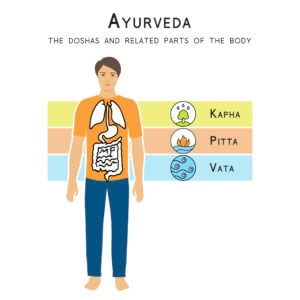Unlocking the Tricks of Ayurveda for a Well Balanced Way of living
Unlocking the Tricks of Ayurveda for a Well Balanced Way of living
Blog Article
Why You Have to Get It: The Transformative Power of Ayurveda Explained
Ayurveda, a time-honored system of medicine, supplies an one-of-a-kind point of view on health that goes beyond plain sign monitoring. By emphasizing the elaborate equilibrium in between spirit, body, and mind, it gives a framework for understanding specific constitution through the concept of doshas. This tailored approach not only addresses physical conditions yet likewise grows spiritual and emotional health. As we discover the core principles and methods of Ayurveda, it comes to be evident that its transformative prospective expands far beyond traditional health paradigms-- raising the question of how it may reshape your understanding of wellness.
Recognizing Ayurveda's Core Principles
Ayurveda, often referred to as the "science of life," is rooted in a holistic strategy to health and wellness that links the physical, mental, and spiritual measurements of health. Central to Ayurveda are the concepts of the five elements, called "Pancha Mahabhuta," which comprise earth, water, air, ether, and fire. These elements combine to form 3 primary energies, or "doshas": Vata, Pitta, and Kapha, each standing for various mixes of physical and psychological qualities.


Understanding these doshas is essential for identifying an individual's unique constitution, or "Prakriti," which overviews customized wellness methods. Ayurveda stresses equilibrium, promoting for a way of life that balances these energies through diet regimen, organic remedies, and daily regimens. Ayurvedic principles insist that health and wellness is not merely the lack of illness yet a state of optimal vitality.
The technique of mindfulness and self-awareness is fundamental, encouraging people to create a deeper connection with their bodies and the setting. By recognizing the interaction of physical and psychological elements, Ayurveda promotes a comprehensive understanding of health that encourages individuals to take charge of their well-being, cultivating a course towards holistic makeover.
Advantages of Ayurvedic Practices
Consistently including Ayurvedic methods right into life can yield a plethora of benefits that enhance total wellness. These classic customs concentrate on achieving consistency within the body, mind, and spirit, resulting in boosted physical health and wellness, mental quality, and emotional equilibrium.
One significant benefit of Ayurvedic practices is their capacity to promote digestive system health and wellness. Individualized dietary referrals, based on a person's dosha, can maximize nutrient absorption and decrease gastrointestinal concerns. Additionally, Ayurvedic natural herbs and spices, such as turmeric and ginger, have anti-inflammatory residential properties that can aid in the avoidance and monitoring of chronic illness.
Furthermore, Ayurvedic methods highlight the relevance of day-to-day routines, called dinacharya, which promote security and predictability in one's life. This uniformity can lower stress levels and enhance efficiency. Mindfulness strategies, consisting of reflection and yoga exercise, not just grow psychological resilience but also enhance emotional guideline.
Last but not least, by cultivating a link to nature and stressing all natural living, Ayurveda urges people to involve in self-care and grow a feeling of area. On the whole, the assimilation of Ayurvedic practices can lead to a more balanced, vibrant, and fulfilling life.
Key Components of Ayurvedic Recovery
At the core of Ayurveda exist three primary parts: the idea of doshas, the emphasis on equilibrium, and the alternative method to health. The doshas-- Vata, Pitta, and Kapha-- stand for the distinct combinations of the 5 elements that regulate private constitutions.
Balance is a recurring motif in Ayurvedic healing, mirroring the belief that wellness emerges from consistency within the body and between Learn More the individual and their atmosphere. Disruption of this equilibrium can lead to condition, necessitating targeted treatments to restore stability.
Furthermore, Ayurveda welcomes a holistic strategy, thinking about physical, psychological, and spiritual aspects of health and wellness. This extensive point of view recognizes that psychological health and this hyperlink way of life selections substantially influence physical health and wellness.
Incorporating Ayurveda Into Life
Incorporating the concepts of Ayurveda into every day life can dramatically enhance total well-being and promote a much deeper link to one's body and environment. By embracing Ayurvedic techniques, people can cultivate balance and consistency within themselves, adjusting to their unique constitution or dosha.

Integrating organic remedies and natural active ingredients into personal care routines can better reinforce Ayurvedic concepts. For example, making use of oils for self-massage, referred to as abhyanga, promotes flow and leisure. Furthermore, including reflection or yoga exercise can boost psychological clarity and emotional stability, promoting an alternative strategy to health.
Last but not least, knowing environmental elements, such as climate and seasonal modifications, allows individuals to change their way of lives appropriately, making sure that their techniques continue to be encouraging and reliable - Ayurveda. By weaving these concepts right into daily life, one can experience extensive advantages, resulting in a much more well balanced and satisfying presence
Personal Changes With Ayurveda
The implementation of Ayurvedic principles right into day-to-day regimens usually brings about significant personal transformations, as individuals start to experience extensive shifts in both physical and psychological health. By welcoming practices such as dietary alterations, herbal supplementation, and conscious reflection, several report increased power degrees, enhanced digestion, and boosted emotional resilience.
People commonly discover that the holistic strategy of Ayurveda addresses not simply symptoms, yet underlying discrepancies within the body and mind. As an example, embracing a customized dietary routine based upon one's Continue dosha can result in weight monitoring, minimized inflammation, and far better overall vigor - Ayurveda. Additionally, the unification of everyday self-care routines, such as oil pulling or Abhyanga (self-massage), promotes a much deeper connection to one's body, advertising self-awareness and nurturing mental health.
As professionals delve deeper right into Ayurvedic philosophy, they often uncover a restored sense of function and quality in their lives. This transformative journey motivates people to cultivate mindfulness, causing much healthier relationships and a higher admiration for the present moment. Eventually, Ayurveda encourages individuals to organize their wellness, helping with a long-term and significant makeover in their lives.
Final Thought
By carrying out and recognizing individual doshas customized methods, Ayurveda fosters optimum wellness and emotional resilience. The concepts of Ayurveda use important insights for growing a satisfying and dynamic life.
As we explore the core concepts and practices of Ayurveda, it comes to be obvious that its transformative potential expands far beyond traditional wellness paradigms-- elevating the concern of just how it may reshape your understanding of health.
Ayurveda, commonly described as the "scientific research of life," is rooted in an alternative approach to wellness that intertwines the physical, psychological, and spiritual dimensions of health. At the core of Ayurveda lie 3 primary parts: the idea of doshas, the focus on balance, and the all natural technique to wellness. Inevitably, Ayurveda empowers people to take cost of their health and wellness, facilitating a long-term and meaningful change in their lives.
By applying and recognizing private doshas customized techniques, Ayurveda fosters ideal health and wellness and psychological resilience.
Report this page